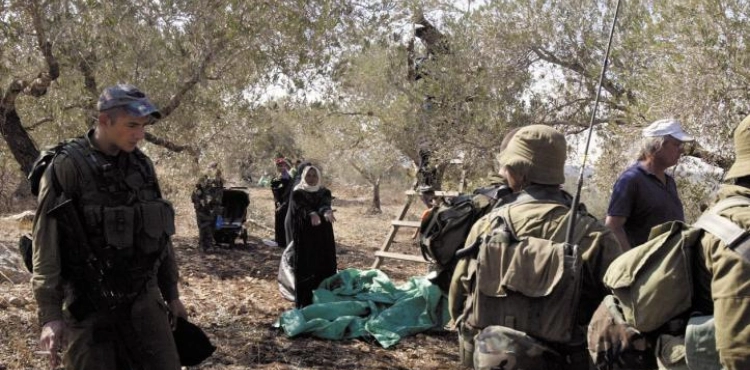Palestinian families in the south of the occupied West Bank wait each morning in the sun for Israeli soldiers to lift the heavy yellow iron barrier at the military checkpoint to cross into their land behind the separation fence and harvest their olive harvest. .
The olive harvest in the Palestinian territories begins in early October and lasts for two months.
Palestinians are waiting for the first autumn rains to begin picking. But many of these fields lie behind Israel´s 709-kilometer "fence" built in 2002, called the Apartheid Wall.
The family of Palestinian Hani Hreibat, about three dunums planted with about 45 olive trees, after the construction of the fence that came on the Palestinian land in the village of Seka and other villages belonging to the city of Dura in Hebron.
"On the first day, we waited for three hours before we were allowed in," said Hani, 36, picking olives with his dusty hands.
He pointed out that Israel completed the construction of the wall in his village about ten years ago, which returned to the owners of the fields with a negative impact.
Hani comes out of his pocket an Israeli permit sheet specifying his entry times between 8 am and 4 pm.
This year, the Israeli authorities allowed Hani and his relatives to enter the territory for one and a half months, excluding Fridays and Saturdays, which are holidays in Israel.
The timing and duration of entry of Palestinians into their lands behind the Barrier varies from one area to another and is determined by the Israeli side.
According to Hani, Israel refuses to grant new permits to other members of his family.
According to the Wall and Settlement Authority, the section of the barrier built on village land is approximately 2.5 kilometers long.
The residents of al-Sikka lost 400 dunams due to the wall, according to the authority, including Hani´s 10-donum share.
"I planted it with wheat and barley," said Hani, who works mainly as a construction worker inside Israel.
He was interrupted by his uncle´s wife, Hadia Abu Eida, saying, "We were deprived of our land. We only entered it in the olive season.
"Even children can no longer come to play."
Authorities allow residents of the village to access their land again during the year for plowing.
The remaining lands of the family produce olives of both turkey and municipal type, all for domestic use. If there is a surplus, the family sells it.
"The olive is better, it gives us more oil," said Hadia, 58, who wore a black cloak and covered her head with a scarf.
Last year, Palestinians produced 14,740 tons of oil and 593,448 tons of olives, according to the Palestinian Central Bureau of Statistics.
According to PCBS, the production of 260 olive presses in the Palestinian Territory was $ 8.8 million.
But last year, Hani was unable to plow his land because of heavy rainfall, which has negatively affected olive production this year.
While he needed a four-minute walk to get from his home to the ground behind the wall, Hani was forced to hire, like others, an agricultural tractor.
Tractors help people transport olive and crop pickers, as well as individuals, who cost 30 shekels (about $ 8.5).
Hani is also forced to take time off from his job to find time to pick olives, which for him is an additional material loss as he receives a daily wage.
"He broke out of school for olives and for fun with my friends," says child Bashir, a first-grader with an agricultural comb that helps him pick olives. "The olive color changes over time. The beginning of the season is green," notes Montaha Abu Eideh, a mother of three, holding a wooden staircase on top of an olive harvest.
The AFP team walked through the olive trees, which were surrounded by dry thorns, up to a second piece of family land.
Al-Hajja was sitting there, Fatima Huraibat, Hani´s mother, 62, lying in an olive tree, wearing a traditional dress embroidered in bright colors. She was working on sorting the olives and cleaning it from dirt.
"I can no longer pick olives because of cartilage erosion in my knees and I need an operation," she says.
But her biggest grief is how she is deprived of her land and cannot enter as easily as before.
"They took our land, stole it, this is our land," she said, pointing to the concrete wall blocks behind her.
Hani said they were being searched before entering the territory.
The olive harvest season witnesses clashes between Palestinians and Israeli settlers, during which there are injuries sustained by settlers and olive trees by burning or cutting them.
According to the Wall and Settlement Authority, documented attacks by settlements until mid-season this year amounted to 120 attacks.












